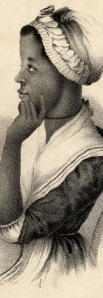
Kidnapped and sold into slavery at age ten, Phillis Wheatley overcame tremendous disadvantages and became the first African American to have ever have their writing published in America—and the first American woman to ever be published. Her writings touched upon the lives of other prominent Americans like George Whitfield, George Washington and countless others; inspiring a generation of Americans and shaping the course of history.
Yet few people know about this remarkable individual.
…and for a while, neither did I.
Truthfully, I was a bit dissapointed when my professor gave me my American author assignment. “Phillis Wheatley?” I said, furrowing my brow. “Who’s that?”
“She was a slave around the time of the Revolutionary War,” my teacher replied, marking some things on his paper. “Gifted poet, fascinating individual. You’ll enjoy learning about her.”
Not convinced. I still hadn’t heard of this person. But what I learned about her astounded me.
Phillis Wheatly was born around 1753 in Western Africa. When she was about ten years old she was kidnapped and taken aboard a slave ship called The Phillis (yes, this is where she got her name).
She was sold as a slave in Boston, Massachusetts to John Wheatley, who turned out to be a very good man. In fact, John Wheatley and his family not only treated Phillis kindly, but they encouraged her education and even tutored her. Within two years of living in the Wheatley home, Phillis Wheatley had become fully literate in the English language, but also studied Latin, Greek, History, Geography, and Science. Truly, a remarkable feat for anyone…but for an African slave girl in that time period? Unheard of.
But Wheatley’s accomplishments went far beyond her tutelage. At age thirteen she wrote her first poem and became an

established (and popular) author at the age of 17!
In 1775, a year before America’s independence had been declared, Phillis Wheatley wrote a poem entitled: “To His Excellency General Washington,” and sent it directly to Washington himself.
The poem compared the struggle of the American colonists to something like The Odyssey: a struggle for freedom of divine and epic proportions. Within the poem, Wheatley also praised Washington’s strength of character and encouraged him to keep fighting.
Busy as he was, General Washington replied to Wheatley and thanked her for her poem. I do not believe that George Washington was unaffected by this poem. To read something—in the middle of a war, when your life is at stake—and then reply to it, is deeply telling.
Furthermore, it is interesting to note that these lines: “First in war, first in peace, first in the hearts of his countrymen” (spoken at George Washington’s funeral) were inspired by the poem which Phillis had written to Washington: Thee, first in peace and honours, — we demand The grace and glory of thy martial band.
In being the first African American woman to be published and the first African American to be published period, the inspirational poetry of Phillis Wheatley takes second place when compared to her inspirational life. This amazing woman, who overcame tremendous odds is, in my mind, more than worthy to be deemed one of America’s Founding Mothers.

You must be logged in to post a comment.